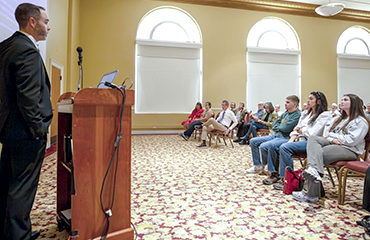
Dr. Matthew Malone had planned his talk for Lander University’s Community Lecture Series to center on disaster preparedness in commemoration of the 35th anniversary of Hurricane Hugo on Sept. 22, 1989.
But an unexpected turn of events upended his plan. “Helene happened,” Malone said of the program, which was renamed “Hurricane Hugo and Helene: What Happens after the Storm?”
The second installment of the 2024-25 lecture series drew a crowd from areas surrounding Greenwood, as well as local community members and Lander students, faculty and staff – all curious about the disaster relief process, as well as preparedness for the next storm or disaster.
Malone, a Lander associate professor of political science and homeland security and program coordinator for the University’s Master of Science in Emergency Management Program, worked for the Alabama Emergency Management before joining Lander’s faculty in 2017.
“Hugo was the largest and costliest disaster in South Carolina until Helene,” Malone said, pointing out that Helene led to power outages for nearly 1.4 million people in the Southeast and thousands of homes destroyed or damaged. “We don’t know the extent of the damage from this disaster yet.”
In addition to discussing the process by which local, state and federal governments and agencies work to provide disaster relief and assistance to individuals and public entities, Malone talked about the need for individuals to be prepared.
A 2023 study by FEMA on disaster preparedness found that 51 percent of adults say they are prepared, but 77 percent believe that “a disaster is likely to impact their lives … we want people to take action before a disaster strikes,” Malone said.
In planning for a disaster, people should prepare necessary supplies for at least 72 hours, which is considered the standard response time for emergency and relief personnel to reach some areas.
Malone answered questions from the audience on topics ranging from hazard mitigation, changes that could be made to flood plain designations, cell phone outages, the use of the National Guard in disaster situations to concerns for vulnerable populations, including children and adults with health problems.
Lander student Sophia Reyes, of Greenwood, a junior criminology and political science double major, asked if emergency plans include the needs of those who are jailed or imprisoned during a storm.
“One thing that emergency managers are told is to consider vulnerable populations, which would include those who are incarcerated,” Malone said. “We should have plans in place for the cities and counties where they are located.”
Reyes said the hurricane led her to wonder about plans for prisoners who are unable to make disaster plans and preparations for themselves. “As a criminology major, I realized these are people who aren’t in control of their situations and can’t make their own preparations.”
She said the lecture gave her a more comprehensive understanding of disaster preparedness in general and how she can prepare for a future crisis. “It was comforting to know that I wasn’t the only one who wasn’t prepared.”
Like Reyes, Sarah Behringer, a senior political science major from Greenwood, said Hurricane Helene caught her off-guard. “We thought the hurricane was only going to be a little bit of rain and wind. Coming here has given me a better understanding of what I can do to be more prepared.”
Every plan needs to be updated frequently, Malone said.
“A plan is a living document that minimally should be revisited once a year, and preferably
more often than that.”
About the Community Lecture Series
Lander’s Community Lecture series is free and open to the community. The next event is on November 12 at the Arts Center of Greenwood. Dr. Franklin Rausch, a history professor, will discuss South Korea’s transformation from one of the world’s poorest countries to a wealthy nation. He will explore its significant global influence in technology, industry, and popular culture. For more information about the lecture series, visit www.lander.edu/events.